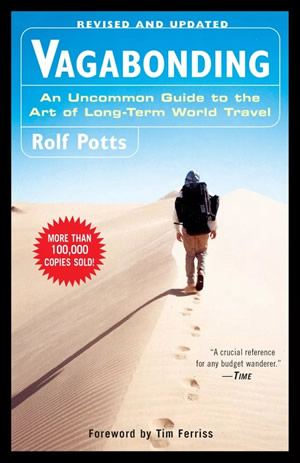Advice to Travel Writers
Make Travel Itself Your First Priority
By Rolf Potts

Several years ago, when I was writing a biweekly adventure travel column for Salon.com, lots of readers wrote in to ask me how they, too, could get jobs as travel writers. This, I'll admit, was a tough question to answer. After all, travel writing is not really something you can study in college, and there are certainly no travel writing job applications at your local employment office. Beyond this, my own accomplishments as a travel writer were the product not of a transferable game plan, but of many years of frustration, persistence, and ambiguous failure. Thus, the best I could tell folks was that — to be a travel writer — you have to travel a lot and write a lot.
In the years since, however, I have expanded my travel writing tips to include ten basic points. Here they are:
1. Travel a lot. There's simply no way to write about travel with any kind of authority unless you get a basic sense for what life on the road is like. Also, it will help if you travel in a dynamic way — opening yourself up to the unknown and interacting with the local cultures. I also advise — for anyone who is really serious about travel writing or even just experiencing the world in a more vivid way — to work a few years in a foreign country (keep reading Transitions Abroad for information on how to do this). This kind of expatriate experience immerses you in a culture in a way that mere travel cannot. Plus, it conditions you to interact with folks, even if you don't fully understand their language or customs.
2. Write a lot. The best way to get published is to write well. The best way to write well is to write often. And, even if you don't get published, you'll have the satisfaction of capturing your experience on paper and intriguing your friends.
3. Read a lot. Nothing exists in a vacuum, and you can't write good travel stuff unless you read good travel stuff. Definitely study your history books and your guidebooks — but don't overlook literary travel narratives, be they in books or magazines. Pay attention to technique as much as content, even when reading novels or general nonfiction.
4. Don't quit your day job. Very few travel writers support themselves entirely on their writing — and those that can support themselves rarely get rich in the process. Find (or keep) a "real world" job to keep yourself in the black. The secret, of course, is to find work that allows you the freedom or option to travel. My own travel-writing budget was initially augmented by funds saved from two years of teaching English in Korea.
5. Read up on the trade. For the basic nuts and bolts of travel writing, go to your local library or bookstore and check out titles such as The Travel Writer's Handbook by Louise Purwin Zobel or Travel Writing by Louisa Peat O'Neil.
6. Surf up on the trade. Good practical information on travel writing is only a click away. Be sure to check several search engines for a breadth of travel writing information. (Editor's note: A good starting-point for beginning travel writers is Tim Leffel's blog and book Travel Writing 2.0).
7. Research your destination. Travel writing always benefits from a good knowledge of the region or culture. Even if you don't use specific information in your article, research can help you write about a place or culture with confidence. Once you've arrived in the country, read the local English-language newspaper for details, quirks, and tidbits.
8. Research your markets. If you are writing for friends or a weblog, you probably know your audience already. But if you're writing for magazines, newspapers, or websites, make sure you're familiar with the publication and its needs. Never approach an editor with an unclear or inappropriate story. Target small, non-paying markets first to build up a body of work. Publishing stories at online travel communities like BootsnAll can be a good way to get started and find an audience.
9. Be patient. A travel writing career is something that develops over many years. Grow a thick skin and get used to having your stories rejected or ignored. Remember that editors are extremely busy people, and don't take their indifference as a personal insult. Once you establish a relationship with an editor, don't let it slide. Be friendly, show your competence, work hard, and don't take things for granted.
10. Nurture your passion. Whatever you do, remember that travel — not travel writing — should be your priority. Always keep traveling and experiencing new parts of the planet. Even if you never get a single story published, you'll most likely discover that you have fallen in love with the world and made your life richer in a way you never could have imagined.
ROLF POTTS is the author of Vagabonding: An Uncommon Guide to the Art of Long-Term World Travel. His travel articles have appeared in most major travel publications and travel anthologies. His articles and posts can be found at rolfpotts.com.
|
